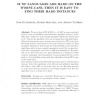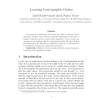14 search results - page 1 / 3 » On Basing Lower-Bounds for Learning on Worst-Case Assumption... |
67
Voted
FOCS
2008
IEEE
15 years 7 months ago
2008
IEEE
122
click to vote
COCO
2005
Springer
15 years 6 months ago
2005
Springer
We prove that if NP ⊆ BPP, i.e., if SAT is worst-case hard, then for every probabilistic polynomial-time algorithm trying to decide SAT, there exists some polynomially samplable ...
101
click to vote
CC
2007
Springer
15 years 1 months ago
2007
Springer
We prove that if NP ⊆ BPP, i.e., if SAT is worst-case hard, then for every probabilistic polynomial-time algorithm trying to decide SAT, there exists some polynomially samplable ...
150
click to vote
JMLR
2012
13 years 3 months ago
2012
Contextual bandit learning is a reinforcement learning problem where the learner repeatedly receives a set of features (context), takes an action and receives a reward based on th...
115
click to vote
EOR
2007
15 years 1 months ago
2007
The purpose of this paper is to learn the order of criteria of lexicographic decision under various reasonable assumptions. We give a sample evaluation and an oracle based algorit...


